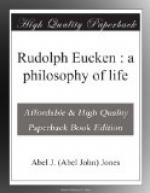The question of the existence of a deeper invisible reality in the world has become as problematic as the doctrines of religion.
To be a whole-hearted believer in the older forms of idealism it is necessary that the universe be regarded as ultimately reasonable and harmonious, and there must be a belief in the possibilities of great development on the part of the human being. But a serious study of things reveals to us the fact that the universe is not entirely reasonable and harmonious. If it were, then man’s effort towards the ideal would be helped by the whole universe, but that is far from being the case; progress means fight, and difficult fight; there is definite opposition to the efforts of man to raise himself. Moreover, there is evil in the world, let pantheists and others say what they will. Eucken refuses to close his eyes to, or to explain away, opposition, pain, and evil—the world is far from being wholly reasonable and harmonious, and idealists must acknowledge this fact. The natural sciences, too, by emphasising the reign of law, tend to limit more and more the possibilities of the human being, ultimately robbing him of all freedom—hence of all possibility of creation. And how can one be an enthusiastic devotee of idealism if he is led to doubt man’s power to aim at, fight towards, or even choose the highest?
Idealism was at its height in those red-letter days when a high state of culture had been attained, and great personalities produced masterpieces in art, music, and literature. The progress of the sciences and of man’s natural activity has directed the spirit of the age towards material progress; the ideals of mankind tend to become external and superficial, and the interest in the invisible world falls to a minimum.
To some extent, too, idealism breathes of aristocracy—a most unpopular characteristic in a democratic age. Experience shows that man is raised above himself only in rare cases, and that the great things in the realms of art, music, and literature are very largely the monopoly of the few, and these mainly of the leisured classes. Hence the appeal of idealism to certain types of men and women must necessarily be a feeble one.
Then, again, there is the general indifference of mankind to lofty aims; this militates against the power of idealism even more than in the case of religion, for while in the latter there is the idea of a personal God who is pleased or displeased urging men to renewed effort, the teachings of idealism may appear to be mere abstractions, and can, as such, possess little driving-power for the ordinary mind.




